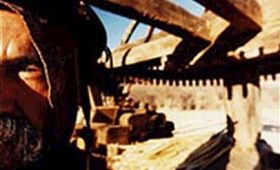
Work the soil. Pa (Dumont) runs the sugar cane mill...
dir Walter Salles
scr Walter Salles, Sergio Machado, Karim Ainouz
with Rodrigo Santoro, Ravi Ramos Lacerda, Jose Dumont,
Rita Assemany, Flavia Marco Antonio, Luis Carlos Vasconcelos,
Everaldo Pontes, Caio Junqueira, Mariana Loureiro,
Servilio De Holanda, Wagner Moura, Othon Bastos
release US 12.Dec.01; UK 8.Mar.02
Miramax 01/Brazil 1h45

 Breathtakingly beautiful production values and deeply felt themes bring this fable-like tale wonderfully to life. It's set in rural Brazil in 1910, in a spot on the road called Stream-of-Souls, so remote that the young narrator Pacu (Lacerda) says it's located somewhere behind the sun. Pacu is the youngest in a family caught in a land feud with the neighbours--it's an eye for an eye as they kill each off one by one. And Pacu's beloved older brother Tonho (Santoro) is next in line. During the phase of the moon in which Tonho enjoys a brief pardon, the brothers have several adventures, rebel against their fiercely demanding father (Dumont) and meet a beautiful young woman (Antonio) who blows fire in a travelling circus. They also make decisions that will have a powerful impact on the increasing violence.
Breathtakingly beautiful production values and deeply felt themes bring this fable-like tale wonderfully to life. It's set in rural Brazil in 1910, in a spot on the road called Stream-of-Souls, so remote that the young narrator Pacu (Lacerda) says it's located somewhere behind the sun. Pacu is the youngest in a family caught in a land feud with the neighbours--it's an eye for an eye as they kill each off one by one. And Pacu's beloved older brother Tonho (Santoro) is next in line. During the phase of the moon in which Tonho enjoys a brief pardon, the brothers have several adventures, rebel against their fiercely demanding father (Dumont) and meet a beautiful young woman (Antonio) who blows fire in a travelling circus. They also make decisions that will have a powerful impact on the increasing violence.
Salles (Central Station) directs the film so strikingly that we can't take our eyes off the screen for a second. Not only are the actors stunning to look at--both beautiful and frightening, conveying their characters perfectly--but the landscape is outrageously expressive, captured in warm earth-tones by cinematographer Walter Carvalho. As the film examines these individuals and the choices they make, there's not only a gripping drama but also a strong statement about human nature, the difficulty in breaking a cycle of revenge, realising where family honour truly originates. This is a gorgeously told story with real meaning in it. At times perhaps it goes a bit too far with all the earth-fire-water-blood symbolism. (We get it long before the story stops drumming it in!) But it's still an unforgettable, wonderful film that deserves to be seen.
| themes, violence, language |

| 15.Feb.02 |

 Jim Felt, Salt Lake City:
Jim Felt, Salt Lake City:  "My concern is the English subtitles of the movie. There were areas where the translator took some kind of license -- certain translations certainly wouldn't have been part of the vernacular of turn-of-the-century-language. It sounded more like something you might hear on an uncensored Jerry Springfield show. I know enough Portuguese that literal translations were not made in those cases. I found the movie was much more dramatic and meaningful by turning off the English subtitles." (20.Jul.04)
"My concern is the English subtitles of the movie. There were areas where the translator took some kind of license -- certain translations certainly wouldn't have been part of the vernacular of turn-of-the-century-language. It sounded more like something you might hear on an uncensored Jerry Springfield show. I know enough Portuguese that literal translations were not made in those cases. I found the movie was much more dramatic and meaningful by turning off the English subtitles." (20.Jul.04)